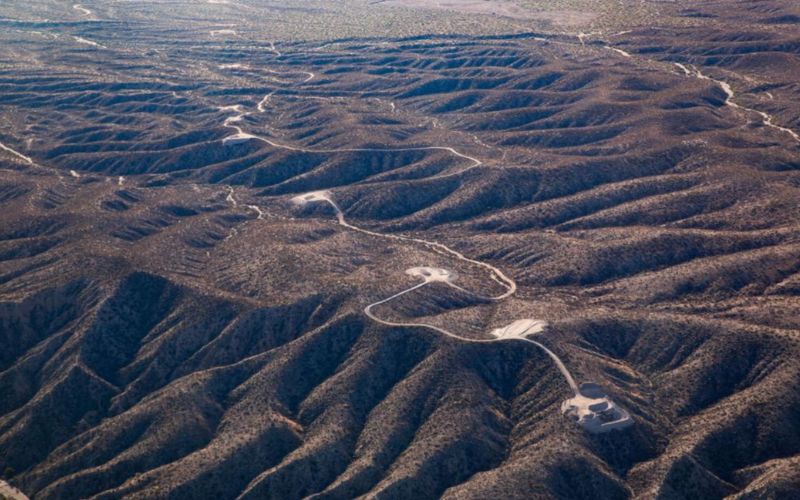
- Details
- By Elyse Wild
The SunZia Southwest Transmission Project will carry wind-generated electricity from New Mexico to California. The 520-mile-long powerline is the biggest U.S. electricity infrastructure undertaking since the Hoover Dam and is being lauded as "the largest clean energy project in U.S. history." Fifty miles of the line is being built through San Pedro Valley, Arizona, which holds cultural significance to the Tohono O’odham, Hopi, Zuni, and San Carlos Apache Tribes.
Tucson-based conservation groups Archaeology Southwest and the Center for Biological Diversity joined the tribes in filing the suit against the U.S. Interior Department and Bureau of Land Management this January, alleging the groups failed to comply with the National Historic Preservation Act (NHPA), Administrative Procedure Act (APA), two executive orders, and President Biden’s November 30, 2022, Memorandum on Uniform Standards for Tribal Consultation for issuing Limited Notices to Proceed (LNTP)
The plaintiffs called for the project to be paused until “the Bureau of Land Management completes a “legally adequate inventory of historic properties and cultural resources that would be impacted by the project.”
The project was approved by BIA in 2015, seven years after Pattern Energy Groups Inc. applied for a right-of-way permit to construct and operate the line. Construction began in 2023.
The suit alleged that the U.S. Interior Department refused to recognize “overwhelming evidence of the cultural significance” of the remote San Pedro Valley to Native American tribes in the region. Plaintiffs alleged the project will cause “serious, irreversible adverse effects on tribal cultural sites and sacred areas, including areas with human remains.”
In her ruling, Judge Jennifer Zipps cites the San Pedro Valley as “one of the most culturally intact landscapes in southern Arizona.” She wrote that BLM had fulfilled its legal obligation to identify historic sites in the construction area and prepare an inventory of cultural resources.
Because SunZia’s route was finalized in 2015, the judge ruled the tribe’s injunction was “time-barred.”
BLM asserts that the project, which is 90 percent completed, avoids direct impacts on cultural resources identified by surveys.
Tohono O’odham Nation stated in a press release that it will continue to pursue legal avenues to protect their land.
“Our goal is not only to protect our ancestorial cultural history and the San Pedro River Valley’s pristine environment, but to also ensure the federal government is held accountable for its actions in violation of laws designed specifically to protect sacred lands,” Tohono O’odham Nation Chairman Verlon Jose said in a statement. "This is far too important of an issue to be deterred by this ruling. The United States’ renewable energy policy that includes destroying sacred and undeveloped landscapes is fundamentally wrong and must stop.”
This article has been updated to include a statement from the Tohono O’odham Nation.
More Stories Like This
Gwich'in Tribal Governments Submit Comments Challenging Fish and Wildlife Service's Inadequate Environmental Review of Arctic Refuge Snow RoadRappahannock Tribe Challenges 9M-Gallon Water Plan
Feds release draft long-term plans for Colorado River management
Apache Leader Walks 60 Miles to Court Hearing That Will Decide Fate of Sacred Oak Flat
Rappahannock Tribe Raises Sovereignty and Environmental Concerns Over Caroline County Water Permit
Help us defend tribal sovereignty.
At Native News Online, our mission is rooted in telling the stories that strengthen sovereignty and uplift Indigenous voices — not just at year’s end, but every single day.
Because of your generosity last year, we were able to keep our reporters on the ground in tribal communities, at national gatherings and in the halls of Congress — covering the issues that matter most to Indian Country: sovereignty, culture, education, health and economic opportunity.
That support sustained us through a tough year in 2025. Now, as we look to the year ahead, we need your help right now to ensure warrior journalism remains strong — reporting that defends tribal sovereignty, amplifies Native truth, and holds power accountable.
 The stakes couldn't be higher. Your support keeps Native voices heard, Native stories told and Native sovereignty defended.
The stakes couldn't be higher. Your support keeps Native voices heard, Native stories told and Native sovereignty defended.
Stand with Warrior Journalism today.
Levi Rickert (Potawatomi), Editor & Publisher


